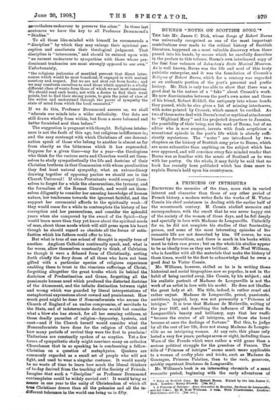BURNS'S "NOTES ON SCOTTISH SONG."*
Tan late Mr. James C. Dick, whose Songs of Robert Bunts was universally recognised as one of the moat important contributions ever made to the critical history of Scottish literature, happened on a most valuable discovery when there passed into his hands, by means which he carefully describes in the preface to this volume, Burns's own interleaved copy of the first four volumes of Johnston's Scots Musical Museum, As is well known, Burns was the life and soul of this truly patriotic enterprise, and it was the foundation of Cromek's Religues of Robert Burns, which for a century was regarded as an authentic portion of the poet's personal and poetic history. Mr. Dick is only too able to show that there was a good deal in the nature of a " fake " about Cromek's work. He now discriminates between the poet's own notes and those of his friend, Robert Riddell, the antiquary into whose hands they passed, while he also gives a list of missing interleaves, with notes printed by Cromek, which cannot be verified. As two of these notes deal with Burns's real or mythical attachment to "Highland Mary" and his projected departure to Jamaica, the possibility of their being, not the work of Burns, but of an editor who is now suspect, invests with fresh scepticism a sensational episode in the poet's life which is already suffi- ciently mysterious. The " notes " are introduced by two chapters on the history of Scottish song prior to Burns, which are more exhaustive than anything on the subject which has ever appeared, and will convince every fair-minded reader that Burns was as familiar with the music of Scotland as he Wks with her poetry. On the whole, it may fairly be said that no book has recently been published which has done more to explain Burns's hold upon his countrymen.










































 Previous page
Previous page